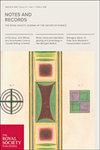‘Homoeopathy flourishes in the far East’: A forgotten history of homeopathy in late nineteenth-century China
IF 0.6
3区 哲学
Q3 HISTORY & PHILOSOPHY OF SCIENCE
Notes and Records-The Royal Society Journal of the History of Science
Pub Date : 2018-09-19
DOI:10.1098/rsnr.2018.0041
引用次数: 1
Abstract
Homeopathy and its transnational transmission have received significant attention from historians of medicine. But the emergence of homeopathy in modern Chinese society has remained little explored. This article identifies the homeopathic practitioners arriving in nineteenth-century China, and then explores their origins, efforts and sense of professional identity in a transnational context. The history of homeopathy in China is found to begin in the late nineteenth century, during which the growth of the Christian missionary enterprise promoted the arrival of sporadic Euro-American homeopathic practitioners, also missionaries, in coastal regions of China. Almost all of them received professional training in American homeopathic medical institutions; and most of them were females, providing additional opportunities for local women patients to receive treatment. The practitioners recognized homeopathy and their collective homeopathic identity, but their healing services were not necessarily essentially homeopathic. Homeopathy that they learnt also evolved and transacted with exotic knowledge during its globalization. Under the influence of homeopathy, some Euro-Americans claimed to have discovered homeopathic elements in Chinese medical ideas and practice. The early history of homeopathy explored in this article helps deconstruct the popular imagination of a coherent ‘Western medicine’ in modern China.“顺势疗法在远东蓬勃发展”:19世纪末被遗忘的中国顺势疗法史
顺势疗法及其跨国传播受到医学历史学家的高度关注。但是,顺势疗法在现代中国社会的出现仍然很少被探索。本文对19世纪来到中国的顺势疗法从业者进行了识别,并在跨国背景下探讨了他们的起源、努力和职业认同感。中国顺势疗法的历史可以追溯到19世纪末,在这期间,基督教传教事业的发展推动了零星的欧美顺势疗法从业者(也是传教士)来到中国沿海地区。他们几乎都在美国顺势疗法医疗机构接受过专业培训;其中大多数是女性,为当地女性患者提供了更多接受治疗的机会。从业者承认顺势疗法和他们的集体顺势疗法身份,但他们的治疗服务不一定本质上是顺势疗法。他们学习的顺势疗法在全球化过程中也与外来知识进行了进化和交易。在顺势疗法的影响下,一些欧美人声称在中国的医学思想和实践中发现了顺势疗法的元素。本文探讨的顺势疗法的早期历史有助于解构现代中国对连贯的“西方医学”的普遍想象。
本文章由计算机程序翻译,如有差异,请以英文原文为准。
求助全文
约1分钟内获得全文
求助全文
来源期刊
CiteScore
1.50
自引率
0.00%
发文量
45
审稿时长
>12 weeks
期刊介绍:
Notes and Records is an international journal which publishes original research in the history of science, technology and medicine.
In addition to publishing peer-reviewed research articles in all areas of the history of science, technology and medicine, Notes and Records welcomes other forms of contribution including: research notes elucidating recent archival discoveries (in the collections of the Royal Society and elsewhere); news of research projects and online and other resources of interest to historians; essay reviews, on material relating primarily to the history of the Royal Society; and recollections or autobiographical accounts written by Fellows and others recording important moments in science from the recent past.

 求助内容:
求助内容: 应助结果提醒方式:
应助结果提醒方式:


